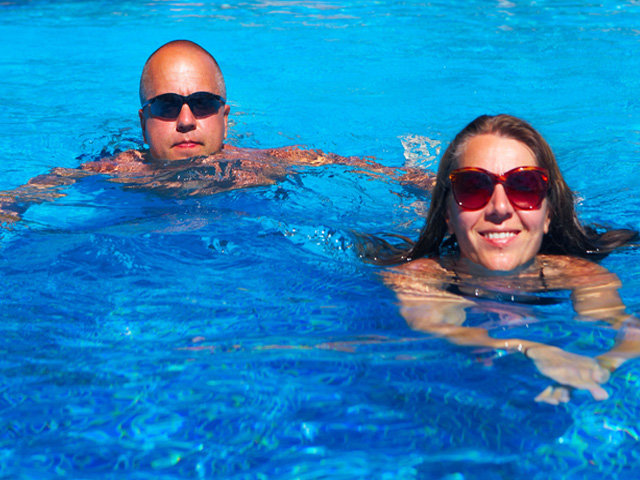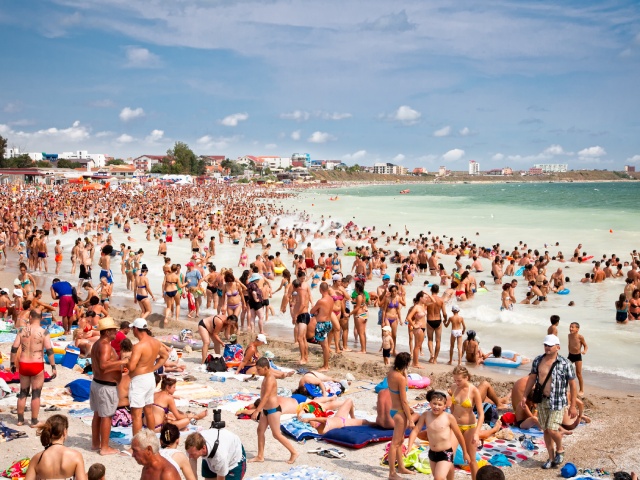Go hiking, be busy doing... (B1)
Expressions followed by ING (338)
Vazby následované ING
Vazby následované ING – procvičování:
Na Landigo máme další související lekce:
- Koncovka ING (A1)
- Předložky s ING (B1)
- Vedlejší věty s ING (B1)
Do you want to go kickboxing on Friday? – Sure, how about watching a movie afterwards?
| Aktivita: |
go kickboxing
|
| Návrh: |
How about watching a movie?
|


Vazby a výrazy následované ING (expressions followed by ING):
- How/What about doing...?:
What about flying to Japan?
- Have a ... time doing:
We had a good time visiting Tokyo.
- Have difficulty/trouble doing:
Did you have difficulty finding the hotel?
- Have an excuse/a reason for doing:
I don't have an excuse for coming late.
- A waste of ... doing:
It was a waste of money buying that luggage.
- Be busy/spend time doing:
We'll be busy planning our holiday.
- Go + aktivita:
I want to go sightseeing and shopping.
- No good/use/not worth doing:
It's no good trying to persuade me.
- Can't help/stand doing:
I can't help laughing.I can't stand waiting.
It isn't worth waiting for Robert. He'll be busy working until at least 5 pm.
|
It isn't worth to wait waiting.
|
|
He'll be busy to work working.
|


How/What about doing...?
Pomocí HOW/WHAT ABOUT + ING navrhujeme:
|
How about driving there? (= Let's drive there!)
|
|
What about getting a cat? (= I suggest we get a cat.)
|
Více o vazbách tohoto typu v lekci: How about...? Why don't...?












I don't feel like cooking today. How about ordering pizza for dinner?
|
How about ordering pizza?
|
|
What about ordering pizza?
|


have a good time doing
Pokud chceme říct, že si někdo něco (ne)užívá nebo také, že je to obtížné/snadné apod., použijeme HAVE A/AN ... TIME + ING:
|
I had such a good time surfing. (= I had a lot of fun surfing.)
|
Surfování jsem si moc užil. |
|
Did you have a difficult time standing up on the board?
|
Bylo pro tebe obtížné se na prkně postavit? |
|
I had an easy time standing up.
|
Snadno jsem se postavil. |




Můžeme také použít BE SOMEONE'S FIRST/SECOND/LAST TIME + ING:
|
It was my fourth time surfing, but my first time standing up.
|
Surfoval jsem po čtvrté, ale na prkně jsem se postavil poprvé. |




Did you have a hard time getting your driving licence?
|
have a hard time getting it
|
|
have an easy time driving
|


have difficulty/trouble doing
Pomocí HAVE DIFFICULTY/TROUBLE + ING vyjádříme, že je něco obtížné nebo problematické:
|
We didn't have difficulty (= we didn't have a hard time) finding the embassy.
|
|
Jessie had trouble passing (= it was hard for Jessie to pass) the exam.
|








Please let me know if you have difficulty booking your tickets.
|
have difficulty booking tickets
|
|
have trouble booking tickets
|


have an excuse/a reason for doing
Pokud máme na něco výmluvu, použijeme HAVE AN EXCUSE FOR + ING:
|
I don't have an excuse for not coming on time.
|
Nemám výmluvu, proč jsem nepřišel včas. |
Pokud máme k něčemu důvod, použijeme HAVE A REASON FOR + ING:
|
What reason do you have for being late?
|
Z jakého důvodu ses opozdil? |
He'd better have a good reason for not joining us tomorrow.
|
He has a reason for not joining us.
|
|
He has a reason for staying in bed.
|


You always have an excuse for not being able to go jogging!
|
You have an excuse for not being able to go.
|


a waste of time doing
A WASTE OF ... + ING použijeme, pokud se plýtvá něčím cenným (časem, energií, talentem...):
|
It was such a waste of time going on a date with her.
|
Byla to úplná ztráta času jít s ní na rande. |
|
I knew it would be a waste of energy trying to convince him.
|
Věděl jsem, že budu jen plýtvat energií, pokud se ho budu snažit přesvědčit. |
|
Buying flowers was a waste of money.
|
Zbytečně jsi za ty květiny vyhodil peníze. |




Můžeme také použít sloveso WASTE ... + ING:
|
I wasted time going on a date.
|
|
I knew I would waste energy trying to convince him.
|




You're only wasting time attempting to fix the washing machine. You should have it fixed by somebody who knows what they're doing.
|
You're wasting time attempting it.
|
|
It's a waste of time attempting it.
|


spend time doing
be busy (with) doing
Pokud nějak trávíme čas nebo nás něco zaměstnává, použijeme SPEND + TIME + ING nebo BE BUSY (WITH) + ING:
|
Do you usually spend several hours a day studying English?
|
|
Gina will be extremely busy preparing for the final exams.
|
|
Everybody was busy packing.
|








Our children are spending way too much time playing video games.
|
They're spending time playing games.
|
|
They're busy playing games.
|


Go kickboxing, go running, go shopping...
Pokud mluvíme o činnosti, kterou děláme pro zábavu (obvykle sport nebo nějaký koníček), použijeme GO + -ING:
















Více o vazbách se slovesem GO v lekcích:
Why don't we go blueberry picking on Sunday?
|
go blueberry picking
|
|
go hiking
|
|
go skiing
|


it's no good/no use/(not) worth doing
Pokud něco stojí za to, použijeme BE WORTH + ING:
|
It was worth visiting the museum. (= It was good/interesting enough to visit.)
|




Pokud něco nestojí za to/je na nic, použijeme BE NOT WORTH/GOOD/USE + ING:
|
It wasn't worth visiting. (= It wasn't good/interesting enough to visit.) It was a waste of time and money.
|
|
It's no good trying to persuade us. (= It's not very useful or effective.) We have already decided.
|
|
It's no use packing a jacket. It's going to be hot.
|
Lze také říct: THERE IS NO POINT IN + ING (There's no point in packing it.)








Více o výrazech, které vyjadřují, že něco (ne)stojí za to, (ne)má smysl apod. v lekci: It is no use, no good, not worth it...
The beach wasn't worth going to. It was incredibly crowded and not very nice.
|
The beach wasn't worth going to.
|
|
It wasn't worth going to the beach.
|


I can't help doing
I can't stand doing
Pokud chceme vyjádřit, že se někdo není schopný něčemu ubránit (smíchu, pláči, myšlence...), použijeme CAN'T/COULDN'T HELP + ING:
|
Don't get angry with her, she can't help being clumsy. (= There's nothing she can do about being clumsy.)
|
|
When I saw his new haircut, I couldn't help laughing. (= I couldn't stop myself from laughing.)
|
|
We can't help thinking they're lying to us.
|
Více o vazbách se slovesem HELP v lekci: Help to do, can't help doing...








I can't help smiling when I'm with Kaira. She always puts a smile on my face.
|
I can't help smiling.
|
|
I can't help laughing.
|
|
I can't help looking at her.
|


Pokud chceme říct, že někdo něco nemůže vystát, použijeme CAN'T/COULDN'T STAND + ING:
|
Thomas can't stand living (= he can't bear to live) with Blake anymore.
|
Thomas nesnese nadále bydlet s Blakem. |
|
I couldn't stand working with Amanda.
|
Nemohl jsem s Amandou vydržet pracovat. |




I can't stand Aaron snoring. I'll have to get earplugs.
|
I can't stand him snoring.
|
|
I couldn't stand sleeping next to him.
|


Doporučujeme si procvičit vazby následované ING (expressions followed by ING) v našich cvičeních.
